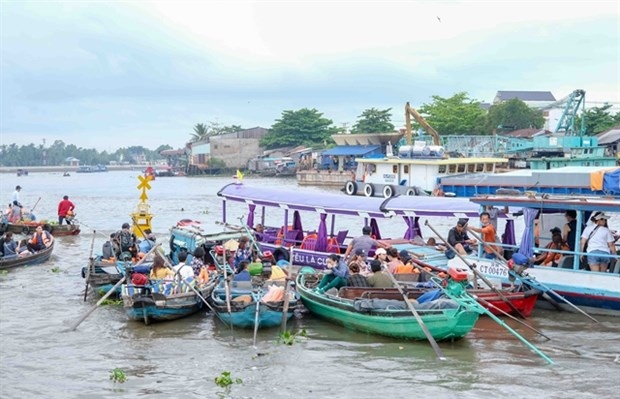Can Tho seeks to develop agricultural tourism
The Mekong Delta city of Can Tho is boosting the development of agricultural and rural tourism to increase added value for agricultural products and improve the lives of rural people.

The city boasts natural advantages for developing agricultural and rural tourism, especially river-related tourism, as it is surrounded by rivers and canals and rural areas account for more than 60% of its total area.
It has 158 rivers and canals, including Hau river, a tributary of the Mekong river. The Hau river runs a total length of 65km through the city.
The city has many localities that offer tourism services in fruit orchards such as My Khanh tourism village in Phong Dien district, Son riverine island in Binh Thuy district and Tan Loc riverine island in Thot Not district.
Ly Van Bon of Son riverine island has successfully implemented a model of breeding fish in floating cages in the Hau river in combination with offering tourism services.
He breeds various types of fish and decorates his floating cages with flower pots, coconut-leaf roofs and small boats made from plastic bottles to serve tourists taking photos.
With these, he receives about 7,000 tourists a year and provides jobs for 40 local workers.
Previously, many farmers on the island worried that tourists could make fish and fruit trees die, but they no longer think that now, he said.
After visiting, tourists buy fruit and fish, and farmers have additional income from selling these products directly to tourists and offering tourism services, he said.
Dao Thi Thanh Thuy, Deputy Director of the city’s Department of Culture, Sports and Tourism, said many farmers in Phong Dien, Cai Rang, Binh Thuy and Thot Not districts have offered tourism services in their fruit orchards.
The development of agricultural and rural tourism has improved incomes for farmers and the infrastructure in rural areas, she said.
In the first quarter of this year, the city received more than 1.5 million tourists, up 76% from the same period last year, and most of the tourists chose to visit ecotourism and agricultural tourism sites and floating markets, she said.
Agricultural tourism services have helped promote the city’s specialised products and products recognised under the country’s “One Commune-One Product” (OCOP) programmes to more consumers.
Tran Thai Nghiem, Deputy Director of the city’s Department of Agriculture and Rural Development, said the city has 92 OCOP products and is promoting their sales at tourism destinations.
Thuan Hoa Food in Ninh Kieu district produces a tea product made from roasted red bean, green bean, black bean, soy bean and brown rice, and it has been recognised as an OCOP product.
Ly Tien Nghia, a representative of Thuan Hoa Food, said the tea is showcased and sold at the Son Riverine Island Agricultural Tourism Cooperative in Binh Thuy district.
Tourists visiting Son riverine island are introduced to the methods and materials used for making the tea and then can taste it, he said.
Tourism destinations are effective channels for promoting sales of products, he said.
He will take the tea to the My Khanh tourism village in Phong Dien district to introduce it to more tourists, he said.
Targets
Can Tho is targeting half of its agricultural and rural tourism services will meet the standards of serving tourists by 2025.
It also aims for 70% of people working in agricultural and rural tourism fields be provided professional skills to serve tourists by 2025.
To meet the targets, the city will focus on developing tourism products that have high quality, are diversified, and meet the requirements of tourists.
It will assist the owners of tourism accommodations to improve their facilities to increase tourism quality and protect the environment.
Can Tho will preserve and develop food making villages and agricultural production, and assist craftmen to develop their production.
It will focus on training tour guides who have deep knowledge about the city’s culture and agriculture and can speak foreign languages.
The city will also provide training courses on professional skills for orchard owners to improve their capacity of managing and developing fruit orchards that offer tourism services.
It is expected to receive 1.3 million tourists visiting agricultural and rural tourism sites in 2025.
